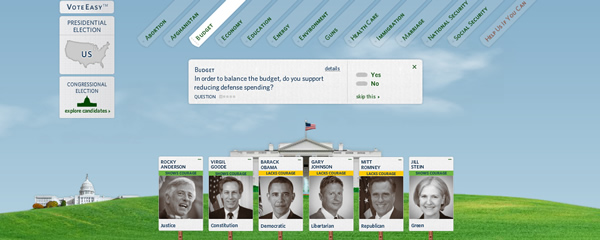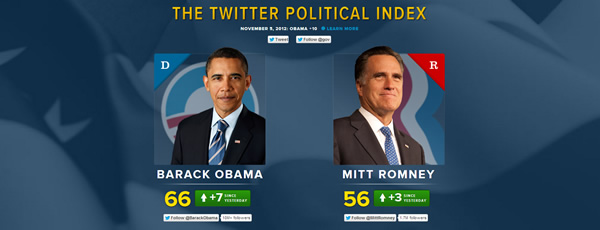Technologically speaking, this election year is poised to be the most sophisticated one ever. Candidates (and voters alike) have seemingly fully embraced social media, social networking and the virality of the Interwebs. The Internet is proving to be an increasingly powerful tool for democracy, so here are some tips for leveraging the Information Super Highway for your election day needs
Make a decision
If you're somehow still on the fence about who to vote for, then you may want to check out Vote Smart's VoteEasy – a webpage which attempts to boil down each candidate based on where they stand regarding 13 hot-button issues. Simply choose your favored answers for each topic and see who's left standing.
Because candidate stances aren't always entirely clear (that's politics for you), Vote Smart employs a Political Courage Test to further refine the results it offers. The PCT is based on the many bi-partisan opinions of hundreds of journalists, pundits and leaders – but don't forget those are just opinions.
Get informed
Additionally, websites like Factcheck.org and Politifact.com aim to sort of the truths and not-so-truths of each candidate. Most of us don't have the time (or will) to independently research every tiny claim, so websites like these can be a great tool for making a more nuanced decisions before hitting the ballot box.
Also, Google just launched its own tool for displaying election year data with clear, well-organized information including a ballot summary, primary results, ad campaign spending and more.
Get real-time results
Many voters and non-voters alike will be interested in the results of the election. If you wish to follow those results closely, plenty of news media websites will be offering real-time election maps like CNN, Fox News, Politico among others.
If you're hoping to watch live video coverage of the event unfold, YouTube's got your back with both pre-recorded and live streaming from ABC and many other networks. Meanwhile, Xbox owners may be glad to know they can enjoy live, interactive coverage via NBC.
Many outlets are utilizing social media to give us better insights too. CNN's Election Center shows who's talking about who on Facebook, including a breakdown of demographics.
Also, the Twitter Political Index attempts to offer insight into what it believes the general "feeling" of tweeters is toward each candidate. Some researchers believe that social networking sites like Twitter and Facebook may be useful in predicting elections -- a theory that will certainly be tested after today's results. Interestingly, some of those same people suggest "herd mentality" may also empower such websites to sway voter opinions in one direction.
Vote!
Google's Election website, by the way, also provides an easy way to find local polling places. If Google doesn't have your local voting booth, it will show you where to look – usually your state's website.
ABC has a concise FAQ which spells out some general election day rules while Gizmodo gives a breakdown of the machines voters will likely encounter at the polls.

